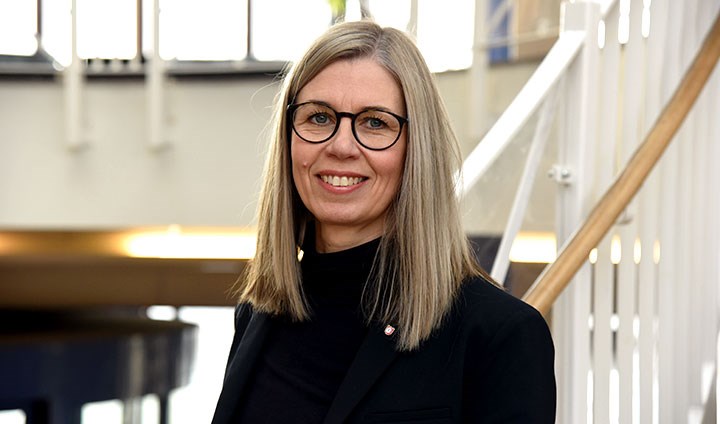Marie Holmefur - new professor 2019

Marie Holmefur is professor of occupational therapy. Her research concerns daily activities and how we can create better conditions for persons with a disability to perform the activities they want, need or must in their everyday life.
1968 Born in Linköping, Sweden
2009 Obtained her PhD at Karolinska Institutet in paediatric science with her thesis The Assisting Hand Assessment; continued development and longitudinal use.
2009 Senior lecturer in occupational therapy at Örebro University
2011-14 Research manager at the Centre for Habilitation Research, Örebro County Council (now Region Örebro County)
2016 Docent in healthcare sciences at Örebro University
2018 Professor of occupational therapy at Örebro University
Marie Holmefur embarked on her research career at Karolinska Institutet where she as a doctoral student studied hand function in children with unilateral cerebral palsy, that is, cerebral palsy that only affects one side of the body. In these children, hand function is impaired to various degrees, and since our hands are central to many everyday activities, training and other interventions aimed at improving hand function are crucial during childhood.
“Together with colleagues at Karolinska Institutet, I worked on developing the evaluation instrument Assisting Hand Assessment, AHA. It is used to describe how well individuals with one-sided disabilities of the arm and hand use their affected hand in two-hand activities.”
Today, AHA is used to follow development, plan and evaluate interventions within both research and habilitation across the globe. Marie Holmefur is currently working on expanding the field of application for AHA. She is also studying how hand function develops over time in children and adolescents with unilateral cerebral palsy.
In recent years, Marie Holmefur has also examined how to make everyday life easier for persons with cognitive difficulties. Our cognitive abilities include reasoning, attention, problem-solving and memory function.
“Cognitive difficulties are the result of a range of conditions, and I am particularly interested in persons with ADHD, autism spectrum conditions and psychiatric conditions. It is common for persons with these conditions to have difficulties in perceiving and managing time and to structure their activities.
As part of her studies, she evaluates a group intervention used within psychiatric care and habilitation and aimed at improving time management skills and structure in everyday life. In the intervention, participants get to practise using a calendar, making to-do lists, and prioritising and planning activities based on their own day and energy curves.
“We have tested the intervention in a pilot study with promising results and a more extensive evaluation is currently underway in collaboration with Region Örebro County, Örebro Municipality and Dalarna County Council.”
Another track of Marie Holmefur’s research is evaluating whether forms and instruments used in healthcare provide valid and reliable results. In addition to AHA, she has contributed to evaluating a number of instruments used within research and clinical practice, among them Assessment of Time Management Skills, Weekly Calendar Planning Activity, and the FOUR score.
“Many of the phenomena and results that we want to measure within healthcare are qualitative, for example how well you perform an activity or how you assess your own ability. But in order to conduct research on a larger scale, we need to be able to quantify these qualitative phenomena in questionnaires or assessment instruments. Safeguarding that the instruments used within healthcare and research are reliable and measure what they are supposed to measure is therefore crucial.”
